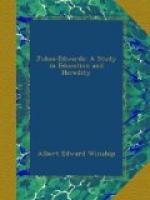It is a well-known fact in sociology that criminals are of three classes: First, those who direct crime, the capitalists in crime, who are rarely arrested, who seldom commit any crime, but inspire men to crime in various ways. These are intelligent and have to be educated to some extent. They profit by crime and take slight risks.
Second, those who commit heroic crimes and find some satisfaction in the skill and daring required. Safe-breaking, train robbery, and some types of burglary require men of ability and pluck, and those who do these things have a species of pride in it.
Third, those who commit weak and imbecile crimes, which mark the doer as a sneak and a coward. These men rob hen roosts, waylay helpless women and old men, steal clothing in hallways, and burn buildings. They are always cowardly about everything they do, and never have the pluck to steal chickens even until they are half drunk. They often commit murder, but only when they are detected in some sneaking crime and shoot because they are too cowardly to face their discoverer.
Now the Jukes were almost never of the first or second class. They could not be criminals that required capital, brains, education or nerve. Even the kind of pauperism and crime in which they indulged was particularly disgraceful. This is inevitably true of all classes of people who combine idleness, ignorance, and vulgarity. They are not even respectable among criminals and paupers.
There is an honorable pauperism. It is no disgrace to be poor or to be in a poorhouse if there is a good reason for it. One may be manly in poverty. But the Jukes were never manly or honorable paupers, they were weaklings among paupers.
They were a great expense to the state, costing in crime and pauperism more than $1,250,000. Taken as a whole, they not only did not contribute to the world’s prosperity, but they cost more than $1,000 a piece, including all men, women, and children, for pauperism and crime.
Those who worked did the lowest kind of service and received the smallest wages. Only twenty of the 1,200 learned a trade, and ten of those learned it in the state prison. Even they were not regularly employed. Men who work regularly even at unskilled labor are generally honest men and provide for the family. A habit of irregular work is a species of mental or moral weakness, or both. A man or woman who will not stick to a job is morally certain to be a pauper or a criminal.
One great benefit of going to school, especially of attending regularly for eight or ten months each year for nine years or more, is that it establishes a habit of regularity and persistency in effort. The boy who leaves school to go to work does not necessarily learn to work steadily, but often quite the reverse. Few who graduate from a grammar school, or who take the equivalent course in a rural school, fail to be regular in their habits of effort. This accounts in part for the fact that few unskilled workmen ever graduated from a grammar school. Scarcely any of the Jukes were ever at school any considerable time. Probably no one of them ever had so much as a completed rural school education.




